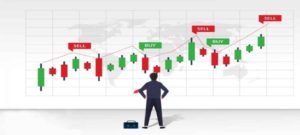How do you react with a trade situation that goes wrong? The most common way that traders learn how to be excellent traders is by repeating the same mistakes over and over again. Having a high level of caution and avoiding mistakes is not just something you do. What type of person do you appear to be when you trade? This list can be used to learn from the errors of other people. A list of the most typical novice trading blunders has been compiled for your considerations.
Not using technical indicators
Even if they aren’t the ultimate secret to success, they can still be useful. Using indicators, traders may examine past performance and make educated guesses about the future. Any trading strategy can benefit from the use of an indicator. Using a combination of relevant indicators can help enhance forecasting accuracy.
Trading without plan
In the hopes that the stock price will climb instantly, many new traders undertake a transaction.
Every trader is aware of the rarity of this occurrence.As a result, they are reluctant to sell and lose. They’re currently clutching their bags.
When a new trader enters a stock, the price rises. For them, it’s not about greed. They eventually lose a winning trade when the trade goes against them.
When you don’t have a strategy, you’re more likely to make mistakes in the market.
Not cutting losses in the right time
This is it! These mistakes account for the vast majority of losses.
Simply because it is a characteristic of all of us. The thought of admitting we’re wrong drives us crazy. Because, in many circumstances, it’s a positive development. Many people do a wonderful job of avoiding confessing their mistakes.
Traders are unable to pay for it. Always exit the room right away if something goes wrong.
Set your stop loss and enter the transaction.
Putting a stop loss on a transaction you think will be profitable may seem counterintuitive, but it may save you a lot of money in the long run.
Clouded by the emotions
There are always bulls and bears on the financial markets.
The price of a stock rises when bulls outnumber bears. When the bears outweigh the bulls, the price drops.
Your mind, heart, and stomach are all caught up in the same struggle. When it comes to fear and greed, there is no middle ground.
Allowing your emotions to influence your decision-making is what generates psychological trading blunders.
It’s great that no one can become a cyborg trader. You must make good use of your feelings.
It’s a dream come true to be able to work from home, provide for your family, and do it all while having fun.
Be wary of losing money, but not so wary that you overtrade or fail to close off a bad trade. You should be wary of losing money.
Keep your foot on the gas. Use your mind to discern when you should be greedy and when you should be fearless.
Overlooking the bigger picture
How do you respond when a deal goes awry? The most prevalent method by which traders become better traders is by making the same mistakes repeatedly. It’s a habit to proceed with extreme caution and avoid making blunders. When you trade, what kind of person are you? You may use this list to learn from other people’s mistakes. For your convenience, we’ve created a list of the most common rookie trading mistakes.
Not using practice balance
Even if the ultimate goal of any trader is to make money, it is sometimes important to take a pause and first practice. Even if you believe you have the perfect trading strategy, it’s never a bad idea to put it to the test on a practice account. It may assist you in identifying and correcting faults, as well as getting you ready to trade with real money.




